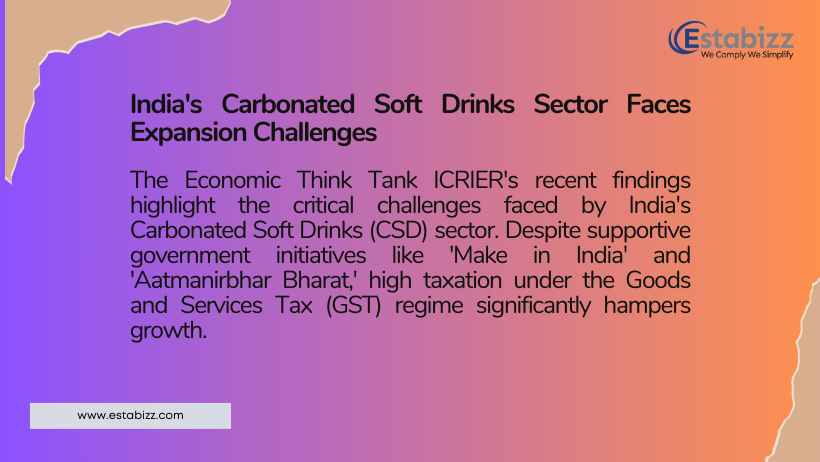India’s Carbonated Soft Drinks Sector Faces Expansion Challenges
Introduction
The Economic Think Tank ICRIER’s recent findings highlight the critical challenges faced by India’s Carbonated Soft Drinks (CSD) sector. Despite supportive government initiatives like ‘Make in India’ and ‘Aatmanirbhar Bharat,’ high taxation under the Goods and Services Tax (GST) regime significantly hampers growth.

High Taxation: A Major Barrier
- GST Impact: The current GST structure imposes a steep 28% tax plus a 12% cess on carbonated drinks regardless of sugar or fruit content, totaling a hefty 40% tax. This high taxation rate discourages product innovation, especially in developing low-sugar varieties.
- Global Comparison: According to World Bank data, India’s tax rate on sugar-sweetened beverages (SSBs) is one of the highest globally. At 40%, it surpasses the tax rates in over 90% of the countries that tax SSBs.
Evolving Consumer Preferences
- Health Consciousness: Consumers worldwide are increasingly adopting healthier lifestyles, favoring low-sugar and no-added-sugar drinks. The CSD market is adjusting by offering more fruit-based and zero-sugar options.
- Global Trends: Producers globally are reformulating products to meet this new demand, often supported by fiscal and non-fiscal incentives from their governments.

Domestic Market Challenges
- Unique Challenges: Indian companies are updating their portfolios but face unique domestic market challenges. Despite efforts, the investment in innovation and variety for CSDs in India remains low.
- Impact of Tax Policies: The ICRIER report underscores that high tax brackets and compensation cess under the GST regime have prevented the CSD segment from reaching its potential in scale expansion.
Current Market Potential
- Revenue Statistics: Despite the challenges, India’s CSD market generated $18.25 billion in revenue in 2022, with a 19.8% CAGR between 2017 and 2022. However, compared to its population size, the market remains relatively small.
- Fruit Production Paradox: India, a significant fruit producer, lags in its CSD manufacturing sector. In contrast to developing nations like Thailand or the Philippines, India offers fewer CSD varieties, representing untapped market potential.
Consumer Behavior and Innovation
- Consumer Demand: Indian consumers are keen to experiment with products like low-sugar CSDs or fruit-based CSDs. However, the market currently sees lower investment, fewer product varieties, and limited innovation in the CSD sector.
- Startup Dynamics: Startups are trying to bring new products to market, but face barriers related to high taxation and limited fiscal incentives.
Leveraging Untapped Potential in India’s CSD Sector
Exploring Untapped Potential
India’s position as a major fruit producer contrasts sharply with its relatively underdeveloped CSD manufacturing sector. This disparity presents a compelling opportunity:
- Untapped Market: The gap between India’s large fruit production capacity and the limited CSD varieties offers a significant untapped market.
- Global Parallels: Countries like Thailand and the Philippines with similar fruit production capacities have diversified their CSD offerings significantly more. Such diversification indicates clear potential for Indian manufacturers.
Addressing Consumer Demand
The evolving preferences of Indian consumers towards healthier beverage options suggest a robust market for innovative CSDs:
- Consumer Trends: Increasing health consciousness among consumers drives demand for low-sugar and fruit-based CSDs.
- Innovation Opportunity: Capitalizing on these trends by investing in R&D can lead to the development of diverse, healthier CSD options that cater to local tastes.
Policy Advocacy for Supportive Measures
The current tax structure presents notable challenges, necessitating advocacy for more supportive fiscal policies:
- Fiscal Policy Reform: Advocating for reduced GST rates and compensation cess can create a more conducive environment for industry growth.
- Government Incentives: Seeking non-fiscal incentives like grants or subsidies for innovation in healthier beverage options can drive industry expansion.
Strategic Expansion Initiatives
To harness the sector’s full potential, strategic initiatives are paramount:
- Investment in Innovation: Encouraging investments in R&D to develop innovative CSD products.
- Market Diversification: Exploring and entering underserved market segments to broaden consumer base.
- Partnerships and Collaborations: Forming strategic alliances with international CSD producers can bring global best practices and technologies to India.
Empowering Business Growth with Estabizz
Navigating these complex dynamics requires expert guidance. Estabizz Fintech Private Limited offers robust solutions, ensuring businesses can thrive:
- Expert Compliance Solutions: Providing comprehensive assistance in navigating financial regulations and compliance, ensuring businesses operate within the legal frameworks.
- International Expansion Assistance: Leveraging global expertise to assist businesses in expanding their reach across multiple countries.
- Tailored Business Strategies: Crafting growth strategies that consider local market dynamics, regulatory environments, and consumer preferences.
Conclusion
India’s carbonated soft drinks sector holds promising potential. Addressing high taxation, aligning with global health trends, and adopting innovative strategies can propel the industry forward. Businesses navigating this complex landscape can rely on Estabizz Fintech Private Limited to provide the support, expertise, and strategies needed to overcome challenges and achieve sustainable growth.
Key Takeaways
- Strategic Innovation: The industry needs increased investment in the development of low-sugar and diverse fruit-based CSDs.
- Policy Advocacy: Addressing high taxation through policy reform and seeking fiscal incentives for innovation.
- Market Expansion: Identifying gaps and untapped potential in the market can provide numerous growth opportunities.
- Leveraging Expert Support: Estabizz Fintech’s authoritative guidance and global expertise can empower businesses to successfully navigate and expand in this competitive market.
- High Taxation Hinders Growth: The 40% tax under the GST regime is a major barrier to innovation and industry growth.
- Shifting Preferences Require Adaptation: Consumer trends favor healthier beverage options, and the Indian market must adjust to meet these demands.
- Untapped Market Potential: India needs to leverage its large consumer base and significant fruit production to expand its CSD varieties and market share.
- Supportive Policies Needed: To reach its potential, the CSD sector requires more supportive fiscal policies and incentives.
Estabizz Fintech compiled the material in this article using the most recent Acts, Rules, Circulars, Notifications, Provisions, Press Releases, and material applicable at the time. They ensured the completeness and correctness of the material through due diligence. When using this material, users must consult the relevant, applicable legislation. The given data may change without prior notice and does not constitute professional advice. Estabizz Fintech disclaims all liability for any results from the use of this material.






